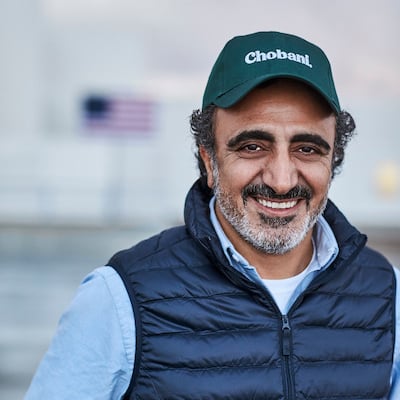“Investing in your most valuable asset—people—is the most important thing you can do," says Chobani Founder & CEO Hamdi Ulukaya.
Since Chobani’s launch in 2005, the company has become one of the largest Greek yogurt companies in the US. An estimated 30% of Chobani employees are refugees and immigrants.
At the 2021 Catalyst Awards, Chobani Founder & CEO Hamdi Ulukaya will keynote a conversation on how to create an environment in which marginalized communities are empowered, paving the way—through support and upskilling—for a more equitable future for all.
Catalyst’s Karina Schroeder asked Ulukaya, who is also a Catalyst Board member, about his own experiences and how they have shaped his diversity, equity, and inclusion (DEI) philosophy.
 Q: How have your own experiences shaped your commitment to diversity, equity, and inclusion?
Q: How have your own experiences shaped your commitment to diversity, equity, and inclusion?
Hamdi Ulukaya: When I started Chobani, we hired everyone we could in the local community in upstate New York. But we were growing so quickly, I needed more help.
Local refugee centers knew people who needed work. Being an immigrant myself, I knew firsthand how much people who come to this country take pride in their work. When you come to America, you’re so grateful to be here and to have this opportunity, you just want to contribute.
So we hired them. Now our plants are like the United Nations. Chobani employees come from every conceivable background—our differences make the team stronger and faster. They bring new ideas and perspectives and drive innovation. I was very lucky to learn that lesson as a young entrepreneur.
And you see this everywhere at Chobani. Women make up half of Chobani’s executive leadership team. And we keep promoting women—39 percent of our mid-level and senior promotions since 2017 have been women. I’m so proud of this.
I don’t think of our approach as supporting diversity or equity. It’s giving opportunity for people who will do something wonderful with it. That’s putting humanity first. And that’s in Chobani’s DNA.
Q: How have you supported Chobani employees during this crisis, and what lessons have you learned?
Ulukaya: Our manufacturing employees and retail specialists are Chobani’s heroes—they never stopped working to bring better food to families and communities throughout the pandemic.
Investing in your most valuable asset—people—is the most important thing you can do.
It’s easier to do that in good times, but the true test comes when you face a crisis. Will you take the easy path or the hard one?
Beyond keeping them safe, Chobani introduced several new measures to support them, including a childcare subsidy, special bonuses, paid time off, and free meals.
This year we increased the starting wage for our entry-level employees to at least $15 an hour, more than double the federal minimum wage.
We did this because it’s the right thing to do. But what you realize is that your business succeeds even more when employees know their company is invested in their success and well-being. And there is no better way to prove that than when you face a challenge like Covid.
Q: Post-Covid, what is the most important action leaders can take to build a more equitable workplace?
Ulukaya: Business leaders need to build and foster a culture that welcomes everyone—just like home.
At Chobani, that means everyone can be themselves and not pretend to be someone else.
But even with that culture in place, I feel an obligation to do better.
This summer’s social justice movement in response to the senseless killing of so many Black brothers and sisters provoked a lot of raw emotions in me and across our organization.
It sparked thoughtful discussions on antiracism by each team within the organization. Now, we’re taking what we’ve learned and using that to improve our own policies and practices.
Just as the world is fighting to beat the coronavirus, we have to eliminate racism and inequality from our communities and workplaces. Fundamentally, we are all human beings who should draw strength from our differences, not [create] division.
Haven’t registered yet for the 2021 Catalyst Awards? Tickets are still available.
As Senior Director, Content Strategy, Karina produced a wide variety of content to advance Catalyst’s research and expertise. She wrote blog posts, monthly newsletters, commentary, and other content both for Catalyst’s website and external platforms. She also worked to ensure that all Catalyst content maintained brand identity and editorial consistency.
Prior to joining Catalyst, Karina was a communications manager at the Vera Institute of Justice. She wrote blog posts, long-form special reports, and op-eds that helped to increase traffic to Vera’s website, recognition of Vera’s on-staff experts, and support for Vera’s mission. In this role she also managed the website, blog, and social media accounts for the MacArthur Foundation's Safety and Justice Challenge.
Karina is a 2015 graduate of NYU Wagner's Fellowship for Emerging Leaders in Public Service (FELPS). FELPS is a rigorous leadership program for recent graduates working in public service. She holds BAs in Journalism and Anthropology from the University of Iowa.